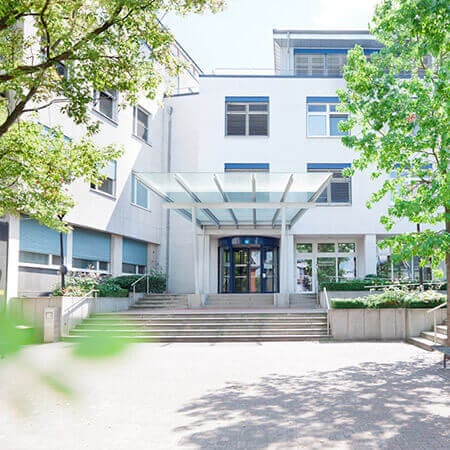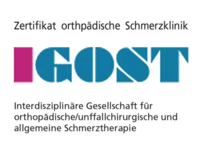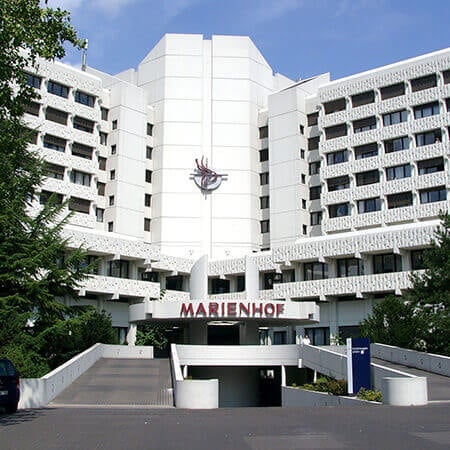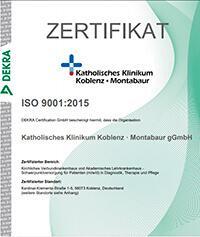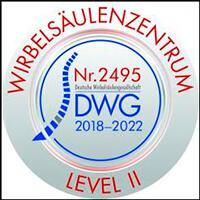Medicine pays great attention to cervical spinal disc herniation. Although the cervical region of the human spine is very small and can be compared to the diameter of a bottleneck, it is responsible for important nerve impulse transmissions going on in the area that provide the brain with sufficient blood supply. The cervical spine itself is the least protected part of the spine, and therefore it can often be subjected to various injuries and pathological processes. With that said, its treatment can be rather difficult. However, cervical spinal disc herniation treatment in Germany is a chance to get rid of the disease forever.
Content
- How to spot cervical disc herniation?
- Diagnostics
- Treatment tactics
- Indications for the surgery
- Specifics of surgery in Germany
- How is the surgery performed?
- Is the surgery for cervical herniated disc dangerous?
- Cervical disc herniation: treatment in German hospitals
- Cost of treatment
- How can you arrange cervical spinal disc herniation treatment in Germany?
How to spot cervical disc herniation?
Cervical herniated discs are one of the most common spinal disorders. The pathological condition can be caused by spinal cord injury or other damage to the bone tissue, as a result of which the spinal nerve is pinched by the intervertebral discs. The slightest pinching of the nerve causes severe pain in the area from the shoulder to the hand. The condition is sometimes manifested by a feeling of muscle weakness in the upper extremities, finger numbness and tingling.
There are several levels of damage to the spinal cord in the cervical region. The pathology most commonly affects the lower regions of the cervical spine, but intervertebral hernias can sometimes be found in the upper regions of the spine as well.
In the early stages, cervical herniated discs manifest as:
- Rapid fatigue of the cervical and spinal muscles for no particular reason.
- A feeling of tightness in the shoulder or chest area.
- The occurrence of pain after prolonged exertion or after an uncomfortable posture.
For later stages, the following is typical:
- A pronounced pain syndrome in the neck and collar zone, which spreads to the head, preventing movement.
- Swelling, redness, inflammation of the affected part of the spine.
- Intense headaches and dizziness, more often in the back of the head.
To prevent these problems from developing and not to put your health at risk, you should visit a doctor as soon as the first alarming symptoms appear. Experienced German doctors, who treat patients from all over the world, will perform a thorough physical examination, ask the patient about the complaints and prescribe the necessary diagnostic procedures. Nowadays, due to state-of-the-art X-ray equipment, the pathological processes in the cervical spine can be detected in Germany at the early stages, which multiplies the patients’ chances for recovery.
Cervical spinal disc herniation is disc damage with the protrusion of its inner part outward.
Treatment includes medications, massage and physical therapy, surgeries.
Cost of treatment with endoscopic or microscopic nucleotomy is from €3,095. You can find other prices on the Booking Health website.
The best hospitals in Germany are:
- University Hospital of Ludwig Maximilian University of Munich
- University Hospital Rechts der Isar Munich
- Helios Hospital Krefeld
- University Hospital Frankfurt-am-Main
- Clinic of Advanced Biological Medicine Frankfurt-am-Main
Diagnostics
Cervical spinal disc herniation treatment in Germany begins with the diagnostics, which is carried out by experienced doctors.
Patients usually come with symptoms occurring due to pinched nerve roots of different localization, based on which the specialists of German hospitals make an initial diagnosis of the localization of the pathological process. A preliminary diagnosis requires confirmation with the help of imaging methods, so doctors perform X-ray examinations, MRI, and spinal computed tomography.
In German hospitals, the examination for herniated discs is not limited only to assessing the condition of the spine. In addition, patients undergo several other medical procedures to help obtain all the information to form a complete objective profile of the disease. This may include scanning of the vessels of the neck, rheoencephalography (assessment of the cervical blood flow), examination of the ocular fundus, etc.
Treatment tactics
The tactics for cervical spinal disc herniation treatment in Germany are always strictly individualized. If the medical condition is at the early stage of its development and has not caused any complications, it is possible to use a combination of conservative methods aimed at controlling the patient's symptoms and preventing further progression of the medical condition.
In all other cases, as a rule, the only real solution is cervical herniated disc surgery. Fortunately, in Germany, spine surgery is no longer something complicated for the doctors or unbearable for the patients. Through the use of innovative minimally invasive surgery techniques, German spinal surgeons can perform all necessary medical manipulations through tiny incisions without damaging neck muscles or adjacent vertebrae, or nearby blood vessels and nerves.
The types of minimally invasive spine surgery include cervical endoscopic spine surgery and microsurgical discectomy, endoscopic and laser reconstruction of the affected intervertebral discs, endoscopic nucleotomy, minimally invasive disc prosthetics, etc.
Indications for the surgery
The patients diagnosed with a cervical herniated disc at the early stages are indicated for comprehensive conservative treatment, which includes taking individually selected medications and physical therapy. Cervical herniated disc surgery is an extreme measure when conservative therapy is ineffective and the disease progression is accompanied by pronounced pain in the neck, movement impairment, numbness or tingling in the hands, frequent and prolonged headaches, impaired hearing and vision or impaired mobility of the upper extremities.
In some cases, when there is a serious health risk, spinal surgery cannot be delayed. It is performed as an emergency in case of sequestering hernias, compression of large blood vessels supplying the brain, or severe nerve and spinal cord compression, with the spinal stenosis or with the risk of trophic and paralytic disorders. In such situations, based on the results of diagnostic procedures, the spinal surgeon recommends a particular type of surgical intervention. Each of them has its advantages and disadvantages, as well as precisely defined indications and contraindications.
Specifics of surgery in Germany
Disc replacement in Germany is a popular option for treating cervical spinal disc herniation, with many patients choosing this advanced procedure over traditional fusion surgery. The cost of disc replacement surgery in Germany, like other forms of spinal surgery in Germany, can vary depending on the specific hospital and surgeon, but generally, the herniated disc surgery cost in Germany is competitive compared to other developed countries, often attracting international patients seeking high-quality care at reasonable prices.
It should be borne in mind that spinal surgery to remove a cervical herniated disc is much more complicated than a similar one on the lumbar spine. Therefore, only highly qualified surgeons with first-hand knowledge of modern sparing techniques of spinal surgery should be trusted to perform it.
The surgeons at hospitals in Germany are just of that kind. German specialists have years of experience, profound knowledge of spine surgery, and high success rates after the surgical interventions for intervertebral disc herniations. They can perform any operation, while up-to-date equipment allows them to perform even technically complicated procedures.
In most cases, cervical herniated disc surgery requires general anesthesia, even if similar procedure on the lumbar spine can be performed under spinal or local anesthesia. For safety reasons, anterior or posterior access is usually used. It should also be noted that modern minimally invasive techniques allow for effective herniated disc surgery without the risk of large scars.
How is the surgery performed?
Surgery is most likely to be performed with the removal of a herniated disc in the cervical spine with subsequent prosthetics of the intervertebral disc.
The most popular, safe, and effective treatment method for cervical herniation is the implantation of a disc prosthesis. The prosthesis can be either static or dynamic. There is little difference between the two, but since there are no perfectly similar diseases and conditions, the spinal surgeon will choose the most appropriate option based on the MRI, specific diagnosis, tests, age, and other indicators.
All manipulations are performed under X-ray control. A special dilator is inserted through a small incision to assist spinal surgery. The surgeon implants an expander and sparingly removes the herniated disc, after which corrects the closing plates of the adjacent vertebrae. The disc prosthesis is inserted over the laminae (the spinal cord) within the vertebral parts, then X-rays are taken and the spinal surgery is completed.
The procedure takes about 50 minutes. After 12 hours, patients can get up to walk and sit.
Today, spine surgery can be performed with either anterior or posterior access.
Anterior access is used for anterior compression of the spinal cord and nerve roots. It is considered the most common access, which can completely solve the problem of cervical herniated discs through the elimination of pain syndrome and restoration of damaged nerve structures. Rehabilitation is short with the ability to go to work already after 14 days after spinal surgery. The restoration of damaged nerve endings occurs immediately after surgery.
Posterior access is used for posterior compression and stenosis of the spinal canal. A posterior incision serves to remove osteophytes (bone spurs) and ligaments pressing on the spinal cord or roots.
Is the surgery for cervical herniated disc dangerous?
The main advantage of all the above accesses is that there is almost no risk of complications. The probability of their occurrence is less than 1%. These are the most sparing methods of hernia removal known to date, but the anterior or posterior access are not universal indications. The indications for such operations are very precise.
The removal of a herniated disc is indicated for herniation sizes of 5 – 6 mm, pronounced pain syndrome, neurological complications, and almost complete absence of other diseases or disorders of the spine and spinal cord.
The spine surgery, in turn, provides more than 98% successful elimination of discomfort. At the same time, most patients notice an immediate improvement.
Cervical disc herniation: treatment in German hospitals
German hospitals are staffed by specialists in neurology and neurosurgery, physical and rehabilitation medicine. German doctors place great emphasis on close interdisciplinary collaboration. The exchange between physicians and therapists in the planning, coordination, and monitoring process ensures optimal treatment management. For patients with chronic back pain, in particular, interdisciplinary medicine with a focus on the holistic approach to treatment is critical for successful recovery.
The list of the best hospitals for cervical spinal disc herniation treatment in Germany is available on the Booking Health website.
Cost of treatment
The tactics and cost of treatment in Germany are determined by the size, the number of hernias, clinical symptoms, and their impact on the patient's health condition. Depending on the results of diagnostic tests and assessment of the patient's condition, doctors may opt for a conservative tactic or a combination of surgical and conservative treatments for cervical herniated discs. In both cases, rehabilitation measures are necessary. Like with therapy for any other disease, if surgical treatment for cervical disc herniation is required, the cost of treatment is determined by the extent of surgical intervention.
The average treatment prices are as follows:
- The price of diagnostics starts at 499 EUR.
- The price of nucleotomy (involving one segment) starts at 3,095 EUR.
- The price of nucleotomy (involving two or three segments) starts at 5,215 EUR.
- The price of nucleotomy (involving four segments) starts at 5,162 EUR.
- The price of discectomy (disc replacement) with the subsequent implantation of the prosthesis starts at 7,386 EUR.
You are welcome to check out the cost of treatment in the specific hospital on the Booking Health website.
How can you arrange cervical spinal disc herniation treatment in Germany?
Basically, there are two options: either you do it yourself or use the services of a medical tourism company.
One of the most transparent medical tourism companies in the world is Booking Health, as it offers the widest possible range of services related to spinal treatment in Germany. Booking Health cooperates with hospitals that specialize in the treatment of spinal disc herniation, which is incredibly important.
Of course, prior to the treatment, it is necessary to undergo diagnostics, which will be professionally handled by German doctors with the help of the latest diagnostic procedures and technology. And if you are not only willing to get high-quality treatment and diagnostics in Germany, but also to take preventive measures to avoid possible complications of spinal diseases, feel free to contact Booking Health by leaving your request on the website.
Our medical advisors will be glad to provide you with all the necessary information concerning the treatment in Germany.
Authors:
The article was edited by medical experts, board-certified doctors Dr. Vadim Zhiliuk and Dr. Sergey Pashchenko. For the treatment of the conditions referred to in the article, you must consult a doctor; the information in the article is not intended for self-medication!
Sources:
Medscape
Science Direct
Web MD
